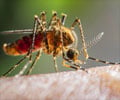Dengue immunity may protect against Zika virus. Dengue virus (DENV) immunity is protective or pathogenic against zika virus (ZIKV) infection.
- Immune cell CD8+ T may provide cross-protection from dengue and Zika.
- Dual infection of Zika and dengue is common.
- Immune cell CD8+ T shows resistance to dengue and Zika virus.
In some parts of the world, Zika is almost like a secondary infection. It has spread to Brazil/Latin America and is moving into places in Asia where people previously had dengue. When one encounters a pathogen in real life, two arms of the immune system spring into action to neutralize it. In the so-called humoral response, B-cells begin to secrete specific antibody proteins, which latch onto and neutralize pathogens in tissue or blood. Simultaneously, a cell-mediated immunity system also becomes active, deploying cytotoxic T-cells to directly recognize and kill pathogen-infected cells.
Cross-protection against dengue and Zika infection
In theory, the ideal vaccine might mimic both antibody and T cell responses to block an infectious disease. But in truth, most (26 of 28 vaccines currently licensed for human use) stimulate primarily a B-cell or antibody response, which in many cases is sufficient. But Shresta’s new work confirms what many vaccinologists are beginning to suspect, namely that protection against thus far intractable pathogens will likely require rallying both B-cells and T-cells.
Specifically, Shresta’s team created the first "sequential" mouse model mimicking dengue-then-Zika infection. To do that, they first infected mice genetically vulnerable to this family of viruses with dengue virus. Those mice became sick, recovered from infection, and hence acquired immunity to dengue, presumably because viral infection had mobilized their immune B-cells, T-cells or both. The group then inoculated the same mice with ZIKV and waited to see if mice showed ZIKV symptoms. But overall, mice that had previously acquired dengue immunity showed protection against Zika, as evidenced by a reduced burden of ZIKV in blood and tissues, such as brain, liver or testis, compared to control mice not "pre-inoculated" against dengue.
"These experiments suggest that the reason that some people infected with Zika do not come down with disease is due to prior exposure to dengue," says Shresta. "This may explain why Zika is not passed to the unborn child of every pregnant woman in dengue-endemic countries exposed to virus."
Adoptive T-cell transfer
In a different experiment, the scientists isolated cytotoxic T cells from the blood of dengue-immune mice and infused them into normal mice, a procedure known as adoptive T-cell transfer. When infused mice were then infected with ZIKV, they also showed disease resistance, supporting the idea that the T-cell arm of the immune system can do the heavy lifting against ZIKV infection.
Jinsheng Wen, Ph.D., a professor at Wenzhou Medical University in Wenzhou City, China, was the study’s first author. Wen says the results from this work are a powerful lesson to vaccinologists currently wrestling with how to design an effective Zika vaccine: "Our work strongly suggests that a successful vaccine would need to include components to induce not only a B-cell response but also a T-cell response." Anti-dengue vaccines that primarily evoke antibody responses are in clinical trials or starting to be licensed in certain countries but show only moderate success. And, there are no approved Zika vaccines, although the US government is partnering with pharmaceutical companies to develop candidates.
References:
- Jinsheng Wen, Annie Elong Ngono et al. Dengue Virus-Reactive CD8+ T Cells Mediate Cross-Protection Against Subsequent Zika Virus Challenge, Nature Communications doi:10.1038/s41467-017-01669-z













